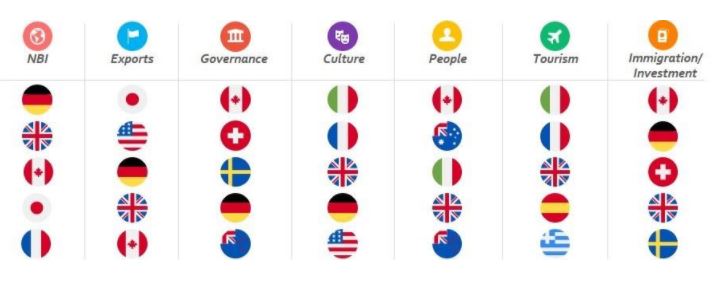The worldview of Canada when it comes to immigration has once again propelled the country’s brand to the top of the charts in a comprehensive study that evaluates the perceptions of 50 nations.
While this year’s analysis is “marked by an overall decline in perception of nations’ reputations,” Germany, the United Kingdom and Canada were the top three in the 2020 Anholt-Ipsos Nation Brands Index (NBI). Canada ranked third for a second consecutive year. The country scored the most points when it came to perceptions on immigration, governance, and its people. Canada also ranked fifth in the exports dimension, and among the top 10 countries in both tourism and culture.
“Canada’s leading performance on the ‘People’ dimension is driven by high ratings for each of the attributes measured within that category,” Jason McGrath, Ipsos senior vice president told New Canadian Media.
Canada’s reputation among global citizens
“Canada ranks first for the welcoming nature of its people, and for the desire of having a close friend from Canada,” McGrath said. “The employability of Canadians is also highly ranked by global citizens, placing Canada at number two of all measured nations for this attribute.”
On Immigration and Investment, Canada performed well on all attributes that form this dimension, he added.
“In particular, Canada is the top-rated nation for being a place that global citizens would want to live and work for a substantial period of time, and Canada is the leading country that cares about equality in society.
“Canada’s relative weaknesses in this dimension [immigration] are for being a good place to study for educational qualifications, and having businesses that global citizens would like to invest in. It’s worth noting, however, that Canada ranks in the top-five of all nations measured for each of these attributes, demonstrating that even in these areas Canada performs well.”
Brand image matters
What really does make a difference is the impact a country is perceived to have on the rest of humanity and the planet, whether positive or negative, said Simon Anholt, who designed and launched the Nation Brands Index in 2005.
“And since a powerful and positive ‘brand image’ feeds directly into more tourism, more trade, more talent and more investment, such considerations should be right at the top of any government’s economic planning. The NBI is telling us yet again that if countries want to do well, they need to do good,” he said.
The pandemic and how governments have handled it have also had an effect on the reputational rankings.
The United States and China are the nations with the most notable declines in the overall NBI rank in this first brand index measurement since the COVID-19 pandemic. The United States’ decline is triggered by a sharp decrease in public opinion of its Governance, People, Tourism, as well as Immigration and Investment – traditional areas of reputational strength for the United States.
China saw an overall rank decline of 12 positions, from 23rd place last year to 35th place this year. China’s ranking fell across multiple categories this year – particularly Governance, People, Tourism, and Immigration-Investment.
Both countries are facing similar reputational challenges stemming from trade tensions and the COVID-19 pandemic, the study authors said.
Conversely, Australia and New Zealand are two nations with notable improvements on the overall NBI rank because of how they approached the challenges imposed by the COVID-19 pandemic. This has reflected positively on these nations’ leadership, infrastructure, and societal values.
Earlier this month, the Environics Institute released a study showing Canadians have become more open, accepting and supportive of immigrants and refugees, a new study shows.
By a five-to-one margin, the public believes immigration makes Canada a better country, said the Environics Institute, which updated its research on Canadians’ attitudes about immigration and refugees last week.
“Strong and increasing majorities of Canadians express comfort with current immigration levels, see immigrants as good for the Canadian economy and not threats to other people’s jobs, and believe that immigration is essential to building the country’s population,” the study authors said in their executive summary.
The Top 5 rankings of the 2020 Anholt-Ipsos Nation Brands Index (NBI).

A multiple-award winning journalist, Fabian Dawson is an internationally acclaimed author, filmmaker and media expert. His work over the last four decades spans the globe and he also serves as a consultant/strategic advisor to a variety of international companies. As deputy editor-in-chief of The Province, part of the Postmedia chain, Dawson led initiatives within a special publications group to provide directed content for a variety of organisations. He was named the 2019 recipient of the Bruce Hutchison Lifetime Achievement Award at Jack Webster Awards. Dawson has been invited by the governments of India, Malaysia, Taiwan, China, Hong Kong and the United States to act as a media observer/advisor on a variety of Asian-Canada issues. Dawson, now operates FD Media, which specializes in harnessing editorial assets to revenue generating opportunities.





